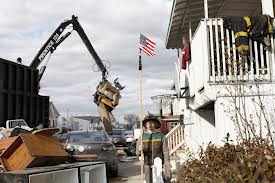 One of the major obstacles to solving the housing crisis has been the reluctance of the holders of mortgage-backed securities (MBS) to recognize losses on mortgages that were under water. Most MBS holders are banks, insurance companies, private institutional investors, Fannie Mae and Freddie Mac (among others). If they were forced to update the values of the homes and mortgages that are included in their MBS pools/securities, they would realize billions of dollars of losses. That mark to market adjustment could bankrupt a number of banks and other holders of those MBS.
One of the major obstacles to solving the housing crisis has been the reluctance of the holders of mortgage-backed securities (MBS) to recognize losses on mortgages that were under water. Most MBS holders are banks, insurance companies, private institutional investors, Fannie Mae and Freddie Mac (among others). If they were forced to update the values of the homes and mortgages that are included in their MBS pools/securities, they would realize billions of dollars of losses. That mark to market adjustment could bankrupt a number of banks and other holders of those MBS.
In the last year, Mortgage Resolution Partners (MRP), a private equity firm located in San Francisco, has been pursuing a unique and unconventional approach to solving the current housing crisis. MRP wants cities to use their powers of eminent domain to condemn under water mortgages, pay the current mortgage holders the current fair market value of homes (which is much lower than the balance on the existing mortgages), and refinance those homeowners with new, smaller mortgage loans. MRP offered to finance this condemnation effort through private capital. Since announcing its proposed plan for solving the housing crisis, MRP has had its supporters and detractors. One of its main critics has been the Securities Industry and Financial Markets Association (SIFMA). This battle between MRP and the MBS industry may now be moot. Why?
Her name is Sandy.
Last week’s devastation created by Super Storm/Hurricane Sandy may have created a game-changing event. While we still don’t know the cost of repairing the destruction caused by Sandy, some people are just beginning to think about how Sandy’s damage will affect them, their families and their homes including the property and casualty insurance companies. While some homes may be repaired and/or rebuilt to their former condition, a substantial number of homes and condos may never be rebuilt again because they are literally (and figuratively) “under water”. Not only is the home flooded with water, in many cases the mortgages on these homes exceeds the current fair market value.
For those who do decide to rebuild their homes, their mortgages provide that the first proceeds from their property insurance companies will be used to pay their existing mortgages. How much they will pay has yet to be determined but if it is based on the current appraised of the home, the result could be the same as MRP’s eminent domain solution.
While Super Storm/Hurricane Sandy’s devastating and destructive path has been felt nationwide, especially by homeowners throughout the East Coast, one silver lining may be the effect Sandy has had on stabilizing the depressed housing market. Sandy may have the unintended consequence of forcing mortgage holders to “mark to market” all mortgages along the East Coast without injecting the politics of eminent domain. That’s nowhere near enough to compensate the people whose lives and families have been turned upside down in Sandy’s wake. Hopefully we will have learned valuable lessons from this national tragedy and maybe some good will come from this, even if it’s something as small as saving the housing market.
 David H. Katz is a former real estate finance and securitization attorney, mortgage banker and investment banker. Mr. Katz is currently a mortgage finance restructure and workout consultant and private real estate investor living in Santa Monica, California.
David H. Katz is a former real estate finance and securitization attorney, mortgage banker and investment banker. Mr. Katz is currently a mortgage finance restructure and workout consultant and private real estate investor living in Santa Monica, California.



